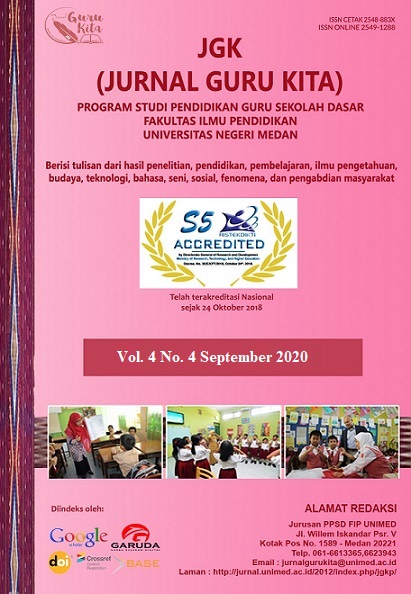PEMBELAJARAN ANAK BERKEBUTUHAN KHUSUS DENGAN STRATEGI DAMPINGI DAN MOTIVASI
DOI:
https://doi.org/10.24114/jgk.v6i3.36618Keywords:
Pembelajaran, Anak Berkebutuhan Khusus Dengan Strategi Dampingi dan Motivasi.Abstract
Abstract: Learning of Children with Special Needs With Accompaniment And Motivation Strategies. This study aims to describe how the teacher's knowledge, learning strategies for ABK students and the obstacles faced in learning for students with special needs (ABK) students at SDN 3 Ulim. This study uses a qualitative approach with the subject of class V teachers at SDN 3 Ulim. Data collection techniques through interviews, and documentation. Data analysis techniques used are data reduction, data display, and drawing conclusions. The results showed that (1) the teacher's knowledge of ABK students was not deep enough, the teacher knew that there were ABK students in his class but the teacher's knowledge about the condition of ABK students was still less specific and did not understand the concepts or characteristics of ABK students, (2) The obstacles faced are: the ABK students are still slow to learn and lack focus in receiving lessons. Efforts are being made to overcome obstacles in the teaching and learning process with ABK, namely with an individual approach, by accompanying, providing motivation and special guidance for ABK students. Keywords: Learning, Children with Special Needs With Accompaniment and Motivation Strategies. Abstrak: Pembelajaran Anak Berkebutuhan Khusus Dengan Strategi Dampingi Dan Motivasi. Penelitian ini bertujuan untuk mendeskripsikan bagaimana pengetahuan guru, strategi pembelajaran peserta didik ABK dan kendala yang dihadapi dalam pembelajaran bagi peserta didik anak berkebutuhan khusus (ABK) di SDN 3 Ulim. Penelitian ini menggunakan pendekatan kualitatif dengan subjek guru kelas V di SDN 3 Ulim. Teknik pengumpulan data melalui wawancara, dan dokumentasi. Teknik analisis data yang digunakan yaitu reduksi data, display data, dan penarikan kesimpulan. Hasil penelitian menunjukkan bahwa (1) Pengetahuan guru tentang peserta didik ABK belum cukup mendalam, guru telah mengetahui adanya peserta didik ABK yang ada di kelasnya tetapi pengetahuan guru tentang keadaan ABK masih kurang spesifik dan belum memahami konsep ataupun karakteristik peserta didik ABK, (2) Kendala yang dihadapi yaitu: peserta didik ABKnya masih lambat belajar dan kurang fokus dalam menerima pelajaran. Upaya yang dilakukan untuk mengatasi kendala dalam proses belajar mengajar yang ada ABKnya yaitu dengan pendekatan individual, dengan mendampingi, memberikan motivasi dan pembinaan secara khusus untuk peserta didik ABK. Kata Kunci : Pembelajaran, Anak Berkebutuhan Khusus Dengan Strategi Dampingi dan Motivasi.References
and Schools. OECD Publishing.
Booth (2011). The Name of the Rose: Inclusive Values into Action in Teacher Education. 41: 303”318
Botha and Kourkoutas (2015). International Journal of Inclusive Education.
Botha, J., Wolhuter (2015). A Psycho-Educational Programme as Intervention to Reduce Destructive Behaviour: Addressing Aggression in the South African Context. . Newcastle: Cambridge Scholars Publishing. 431-457.
F. Yusuf (2008). Evaluasi Program dan Instrumen Evaluasi untuk Program Pendidikan dan Penelitian. Rineka Cipta. Jakarta.
Irvan (2017). Pengetahuan Mahasiswa Pg-Paud Unipa Surabaya Tentang Pendidikan Inklusif. Jurnal Buana Pendidikan.
Laluvein (2010). Schooll Inclusion and the Community of Practice. International Journal of Inclusive Education. 14 (1): 35-48
M. Yusuf and Choiri (2018). The Effectiveness of Inclusive Education and Child Protection Training on Understanding Inclusive Education Subject Matter. Journal of ICSAR. 2 (1).
Mooij, T., Smeets (2006) Design, Development and Implementation of Inclusive Education. Educational Research Journal. 5 (2).
Nasution (2011). Berbagai pendekatan dalam proses Belajar dan Mengajar. Bumi Aksara. Jakarta.
Permendiknas Republik Indonesia Nomor 70 tahun 2009 2011. Pendidikan Inklusif Peserta Didik yang memiliki Kelainan dan Memiliki Potensi CIBI. Direktorat Pembinaan PK-LK Dikdas. Jakarta.
Purnama (2014). Sekolah Inklusi dan ABK. URL: https://www.kompasiana.com/anin.rianto/54f6c350a33311c55c8b48ae/sekolah-inklusi-dan-abk.
Rezeki and Rusydi (2013). Pekerja Sosial dan Pendidikan Inklusi. Prosiding Ks: Riset & PKM. 2 (2): 228-233.
Salim (2013). The Prevalence of Children with Special needs In Inclusive Elementary Schools in Iodine Deficiency Area. 1.
Sugiyono. (2015). Metode Penelitian Pendidikan Pendekatan Kuantitatif, kualitatif, dan R&D. Bandung: Alfabeta.
Sukmadinata, Nana Syaodih. (2010). Metode Penelitian Pendidikan. Bandung : Remaja Rosda Karya.
Widoyoko (2011). Evaluasi Program Pembelajaran Panduan Praktis bagi Pendidik dan Calon Pendidik. Pustaka Pelajar. Yogyakarta.
http://www.slideshare.net/WarmanTateuteu/strategipembelajaran- bagi- anak-berkebutuhan-khusus.html,
https://www.kompasiana.com/najlafebinadhila/5ee8dca4097f361a34475cd3/sistem-penyelenggaraan-pendidikan-inklusif?page=all&page_images=1
Downloads
Published
How to Cite
Issue
Section
License
Authors published with the JGK (Jurnal Guru Kita) agree to the following terms:
- Authors retain copyright and grant the journal the right of first publication with the work simultaneously licensed under a Creative Commons Attribution License (CC BY-SA 4.0) that allows others to share the work with an acknowledgment of the work's authorship and initial publication in this journal.
- Authors are able to enter into separate, additional contractual arrangements for the non-exclusive distribution of the journal's published version of the work (e.g., post it to an institutional repository or publish it in a book), with an acknowledgment of its initial publication in this journal.
- Authors are permitted and encouraged to post their work online (e.g., in institutional repositories or on their website) prior to and during the submission process, as it can lead to productive exchanges, as well as earlier and greater citation of published work. (See The Effect of Open Access)


























